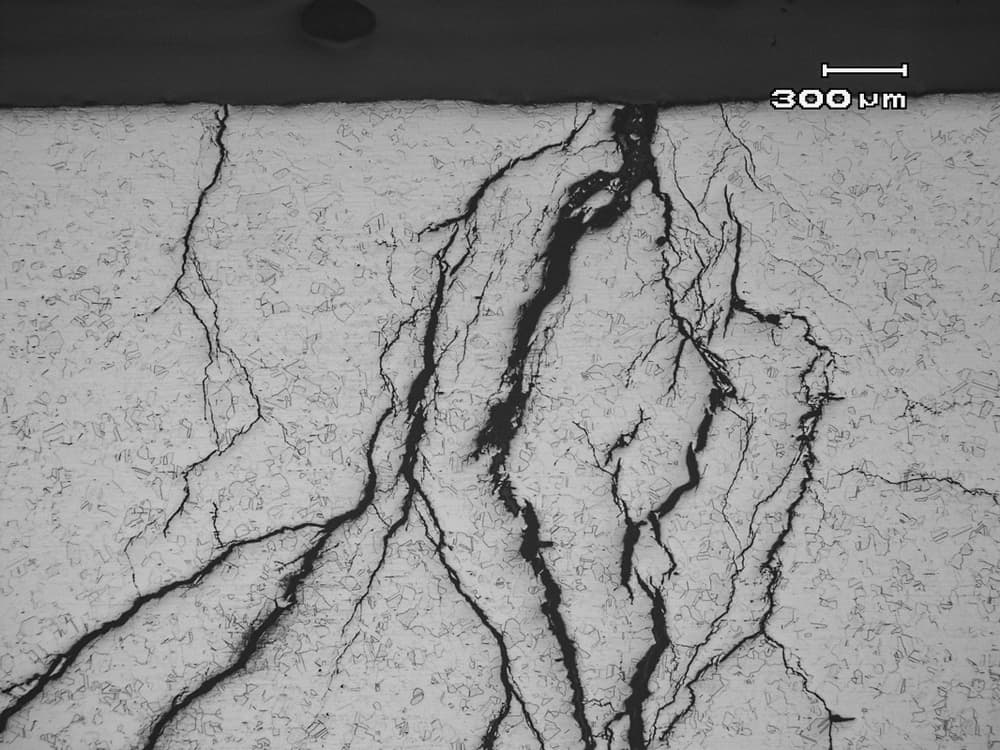Detecting Stress Corrosion Cracks in Process Piping

In industries like oil and gas where pipelines are the major components in operation, issues like stress corrosion cracks can be a common occurrence. Stress corrosion cracking is often induced in the pipelines as a result of excessive stress due to high pressure and corrosive environmental agents. These cracks can be difficult to detect in the beginning but may increase to form patches consisting of individual cracks. This type of flaw in process piping can be catastrophic and severely damaging to the serviceability and safety of an operation.
As a preventive measure, it is crucial that pipes are inspected for potential stress corrosion crack colonies. With ultrasonic testing (UT), it is possible to monitor the quality and strength of a pipe system through early flaw detection.
Stress Corrosion Cracks in Pipes
There are many factors involved in the formation of pipe corrosion cracks. This may include:
- The characteristics of the pipe material including type and composition of carbon steel, steel grade as well as the manufacturing process and its cleanliness can indicate the susceptibility of the pipe to corrosion-induced cracking.
- Environmental factors such as soil type and moisture content can dictate the possible formation of stress corrosion cracks.
- The part of the pipeline where coating damage has occurred can be the inception point for the flaw due to its inability to resist a corrosive environment.
- The presence of cathodic protection current can give rise to a carbonate or bicarbonate environment, triggering high or near-neutral pH stress corrosion cracks.
- High tensile stress in the pipelines due to external or internal load factors can lead to cracking in the pipes.
The cracks induced in the pipeline due to these potential factors can be difficult to visually detect, but with time, the cracks can grow to form colonies which can ultimately lead to structural failure. Especially in certain ERW (electric resistance welded) pipelines and other select seam types, this type of issue can be linked to operational or safety risks.
The early detection of minor cracks in pipelines is key to preventing the risk of failure. Phased array ultrasonic testing (PAUT) is the ideal choice in this process.
Effectiveness of PAUT Inspection in Detecting Stress Corrosion Cracks
Corrosion can wear the surface of the pipeline affecting its performance and strength. Therefore, it must be detected as early as possible. Oftentimes, pipelines are buried, making inspection even more challenging. To prevent the sudden failure of a structure due to undetected corrosion, non-destructive testing (NDT) is often relied upon because of its ability to help technicians identify even the microscopic flaws and deviation in a component. PAUT inspection provides an ideal option for corrosion detection in the pipeline system. Advanced ultrasonic technology can:
- Identify variation in metal thickness, which can be an indication of corrosion.
- Detect extremely fine cracks and colonies in metals of different thicknesses.
- Provide high-resolution imaging that can be used for locating and determining the size of a flaw for further remedial measures.
With the ability to locate and identify a flaw in the early stages of its formation, technicians can focus on repairs or other measures to maintain structural and operational integrity.
NDT Ensures Strength and Minimize Risks
The phased array ultrasonic testing method provides a focused view in the inspection of process piping to detect stress corrosion cracking. The ability to locate and identify the type and size of the flaw provides the opportunity for preventive maintenance of the pipe system. The result can also be further utilized to identify the potential root cause of the flaw. With easy-to-use PAUT application-specific probes and advanced instruments, industries can focus on the quality, safety, and cost-efficiency of the operation.
Zetec is a global leader in nondestructive testing (NDT) solutions for the critical inspection needs of industries. Our ultrasonic technologies help clients ensure the quality of process pipes with thorough detection of stress corrosion crack. Contact us today to learn how we can deliver solutions to optimize productivity, safety, and total cost of ownership.
